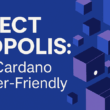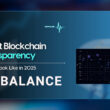The blockchain is a technology for transferring and registering digital data with very sophisticated encryption, which gives it security, providing reliability.
Decentralization is one of the fundamental pillars of blockchains, which is obtained with public and permissionless participation, which, added to that coding, results in the immutability of the registered information.
Without the intervention of a centralized intermediary that identifies and certifies the information, the multiple independent nodes validate the operations with a consensus algorithmic protocol.
Surely, what you have just read is familiar to you from the technological point of view, but I invite you to read an article that I have published, and that deepens the conceptual idea. You will find the link at the end (1).
Organization is one of the most important activities in societies. People come together with a goal, which requires certain tasks, and many of these are repetitive. One of the most important utilities that programmable blockchains with smart contracts, such as Cardano, allow is the creation of a DAO, (Decentralized Autonomous Organization).
A DAO is a system that runs on a blockchain protocol in a complete and autonomous way, according to codified rules through smart contracts, dispensing with human intervention to coordinate usual tasks, and granting transparent governance to the participants, for the taking of decisions. My article published on this subject, link at the end (2).
Considering the two topics that I have raised, decentralization and the DAO, let’s see the proposal that I tell you about in this article.
The proposal: StakingDAO
The classification shown by wallets and Pool Explorers is not clear or user-friendly, much less for those with less knowledge about Cardano delegation, resulting in favoring large pools, saturated or close to this, encouraging these SPOs to create new stakepools to divide their delegation, and avoid saturation, which tends to centralize the network in a few hands.
StakingDAO will promote Single Pool Operators, Eco-friendly and Mission Driven Pools, as well as help seed new Stake Pools.
This DAO will allow members to automatically delegate to sustainable, bare metal or individual pools, and it will balance the delegation.
The DAO will have 3 purposes
- Supporting small and sustainable pools
- Fostering network decentralization
- stakingSimplifying staking for new users
Supporting small stakepools, and even encouraging new ones, is really important to help build a strong and stable network and, As it stands today, individual stakepools only account for 18% of total participation, down in recent weeks from a high of 23%.
This DAO will allow SPOs to register and receive a delegation distributed by the DAO to allow a ‘rising tide’ for single pools to be sustainable.
ADA holders can delegate to theStakingDAO as a self-managed delegation method, and the DAO will do the work of distributing all user wallets to balance delegation across all stakepools.
This will allow the average user to contribute to decentralization without having to research pools, or understand much about the decentralization issues we currently face as an ecosystem.
It will also allow stakepools to gain support without having to rely solely on promoting their pools, or sourcing supporters, concentrating delegation on those most competent or with the most capital to trade.
How will the DAO work?
The StakingDAO will have its own governance token, which will be distributed with the block ADArewards, both to users and SPOs.
This token will be needed to vote changes to the DAO.
The DAO will accept requests from SPOs to enroll pools, and will select and classify them according to which of the supports they operate (eco / bare metal, etc.).
The DAO will collect all wallet addresses and balance the total user wallet, so that it is distributed evenly across participating stakepools, with smaller wallets going to more saturated pools, and larger wallets helping to have a bigger impact. in the smaller pools.
Users will have the option to specify the types of pools they wish to support, or to engage in a blanket delegation strategy that encompasses all individual pools in the DAO.
The DAO will be able to seed delegation into new pools, taking a portion of the wallet, or by having a seed option in the DAO, so users can choose to help seed new, non-StakingDAO pools to get their first block.
This will provide up to 5 epochs of delegation, to give them a chance to prove their proficiency as an SPO, before being added to the normal distribution, and being part of the DAO.
The StakingDAO will have rules around membership, will require pools to maintain a certain level of sliding fee, to ensure pools are not abusing this system, and will also track pool activity to ensure SPOs take action. responsibly, maintaining and updating their pools.
If the DAO detects a breach of a stakepool, it will contact 1 notification to correct them, if it is not updated or adjusted, it will spend an epoch on hold, and if finally there is no action, then it will be removed from the list. The DAO will restructure the delegation, choosing another pool.
Extreme behavior with signs of bad acting will not be tolerated. StakingDAO reserves the right to remove pools without prior notice.
The Budget
The funds will pay for the initial 3 months of development work, both for the backend and the web user interface.
Once the initial 3-month development period has passed, the DAO will release tokens to create a treasury.
This treasury will be the sustainability of the DAO, it will pay for further development work.
- Web developer 15,000 Blockchain
- development of 15,000
- Marketing and incorporation of 5,000
Funds requested in USD 35,000
The Roadmap
The team proposes the following success goals:
In 3 Months: Beta launch on Testnet, and MVP (Minimum Viable Product) web application for Mainnet users.
In 6 months: public launch of the complete DAO platform, on Mainnet.
In 12 months: Fully operational DAO, managing a portfolio of over 1B ADA, with 1,000 staking pools.
The team
The information published about the team tells us that it is made up of three members, all stakepool operators:
- Rhys has the function of sales, marketing and web development in this undertaking.
- Edi is a software developer, with more than 20 years, Plutus Pioneer.
- Dhruv handles software and web development
Rhys Morgan says he has been running the London-based, solar-powered STOIC stake pool for over a year and is a member of relevant alliances.
In this video he tells us about the proposal:
The original proposal, here.
My mentioned articles :
(1) Decentralization As a Way of Life?
(2) Decentralized Autonomous Organization (DAO): The Brief History, Challenges, and Lessons Learned










